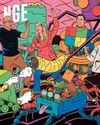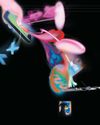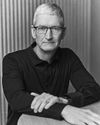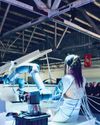
JAIME TEEVAN JOINED Microsoft before it was cool again. In 2006, she was completing her doctorate in artificial intelligence at MIT. She had many options but was drawn to the company's respected, somewhat ivory-tower-ish research division. Teevan remained at Microsoft while the mother ship blundered its way through the mobile era.
JAIME TEEVAN CHIEF SCIENTIST
Then, as the calendar flipped into the 2010s, an earth-shattering tech advance emerged. A method of artificial intelligence called deep learning was proving to be a powerful enhancement to software products. Google, Facebook, and others went on a tear to hire machine-learning researchers. Not so much Microsoft. "I don't remember it like a frenzy," Teevan says. "I don't remember drama." That was a problem. Microsoft's focus remained largely on milking its cash cows, Windows and Office.
In 2014, Microsoft surprised people by promoting the ultimate company man, Satya Nadella, to CEO. Nadella had spent 22 years pulling himself up the ranks with his smarts and drive. And his likability. The latter trait was a rarity at the company. Nadella knew its culture intimately, and he knew he had to change it.
Three years later, Teevan became Nadella's third technical adviser-and the first to have a background in AI. Then she became chief scientist, and her task was to imbue the company's products with the AI of the time. In 2019, Nadella made the bold decision to spend $1 billion to partner with OpenAI, the small but trailblazing company that was leading the field. Microsoft was given unbridled access to its technology. It was a risky bet-even experts like Teevan, who'd seen OpenAI's progress over the years, were skeptical that the tech would make much of a difference.
This story is from the January - February 2025 edition of WIRED.
Start your 7-day Magzter GOLD free trial to access thousands of curated premium stories, and 9,000+ magazines and newspapers.
Already a subscriber ? Sign In
This story is from the January - February 2025 edition of WIRED.
Start your 7-day Magzter GOLD free trial to access thousands of curated premium stories, and 9,000+ magazines and newspapers.
Already a subscriber? Sign In

MOVE SLOWLY AND BUILD THINGS
EVERYTHING DEPENDS ON MICROCHIPS-WHICH MEANS TOO MUCH DEPENDS ON TAIWAN. TO REBUILD CHIP MANUFACTURING AT HOME, THE U.S. IS BETTING BIG ON AN AGING TECH GIANT. BUT AS MONEY AND COLOSSAL INFRASTRUCTURE FLOW INTO OHIO, DOES TOO MUCH DEPEND ON INTEL?

FOLLOW THAT CAR
CHASING A ROBOTAXI FOR HOURS AND HOURS IS WEIRD AND REVELATORY, AND BORING, AND JEALOUSY-INDUCING. BUT THE DRIVERLESS WORLD IS COMING FOR ALL OF US. SO GET IN AND BUCKLE UP.

REVENGE OF THE SOFTIES
FOR YEARS, PEOPLE COUNTED MICROSOFT OUT. THEN SATYA NADELLA TOOK CONTROL. AS THE COMPANY TURNS 50, IT'S MORE RELEVANT-AND SCARIER-THAN EVER.

THE NEW COLD WARRIOR
CHINA IS RACING TO UNSEAT THE UNITED STATES AS THE WORLD'S TECHNOLOGICAL SUPERPOWER

CALIFORNIA DREAMIN'
KINDRED MOTORWORKS VW BUS - Despite being German, the VW T1 Microbus is as Californian as the Grateful Dead.

THE INSIDE SCOOP ON DESSERT TECH
A lab in Denmark works to make the perfect ice cream. Bring on the fava beans?

CONFESSIONS OF A HINGE POWER DATER
BY HIS OWN estimation, JB averages about three dates a week. \"It's gonna sound wild,\" he confesses, \"but I've probably been on close to 200 dates in the last year and a half.\"

THE WATCHFUL INTELLIGENCE OF TIM COOK
APPLE INTELLIGENCE IS NOT A PLAY ON \"AI,\" THE CEO INSISTS. BUT IT IS HIS PLAY FOR RELEVANCE IN ALL AREAS, FROM EMAIL AUTO-COMPLETES TO APPS THAT SAVE LIVES.

COPYCATS (AND DOGS)
Nine years ago, a pair of freshly weaned British longhair kittens boarded a private plane in Virginia and flew to their new home in Europe.

STAR POWER
The spirit of Silicon Valley lives onat this nuclear fusion facility's insane, top-secret opening ceremony.